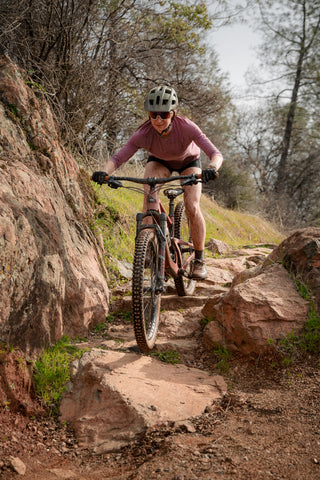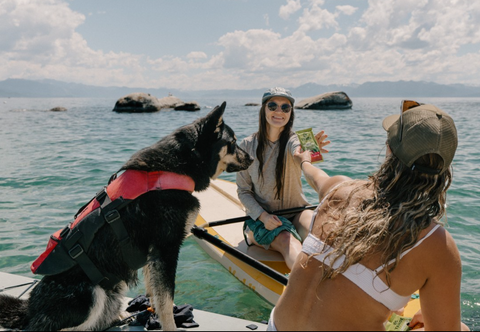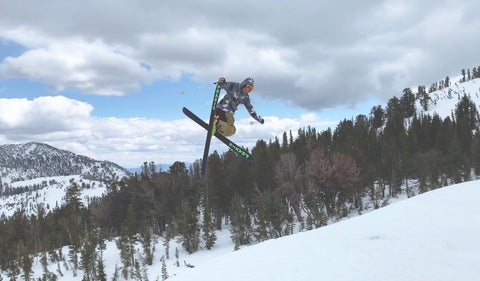
A cup of hot, buzzy coffee is a non-negotiable necessity for many of us first thing in the morning. Its eye-opening effects mean that many of us rely on our daily cup of joe for powering up, fighting off sleepiness, and getting ready to tackle everything that happens to be on our agenda for the day. But do the same energizing benefits of coffee make it a good pre-hike drink? Here’s everything you need to know about drinking coffee before a hike, plus other ways to naturally boost your energy while exploring all the beautiful sights that nature has to offer.
Caffeine: coffee’s buzzy key ingredient
Coffee owes its energizing properties to caffeine, its active ingredient. Caffeine is a “stimulant” psychoactive drug -- in other words, it helps to activate your central nervous system (in other words, your brain), making you feel more awake, motivated, and animated for the rest of your day.
Coffee beans are a great natural source of caffeine, which is probably why so many of us reach for that morning cup of joe to get going first thing in the day. On average, a cup of coffee contains about 95 mg of caffeine. Other sources of caffeine include tea, energy drinks, and pre-workout supplements.
The benefits of drinking coffee before a hike
So now that we know a little more about caffeine, let’s talk about how it can help propel you and keep you going during a hike!
It can make you feel more energized.
To understand how caffeine helps you feel more energized, let’s dive into a little bit of neuroscience. Adenosine is a neurochemical that is responsible for making you feel sleepy and drowsy. Caffeine, on the other hand, is a stimulant that works by blocking your brain’s receptors for adenosine, ultimately minimizing drowsiness and fatigue and helping you feel more awake.
Because of its rousing caffeine content, coffee is often used by athletes and fitness enthusiasts as an ergogenic aid, or a supplement that helps enhance their performance. In fact, you’ll often find athletes taking “pre-workout,” a sports supplement containing caffeine that is intended to help boost your focus shortly before starting a workout so that you can get the most out of it.
The same idea can also apply to drinking a cup of coffee before you head off on a long trek in the outdoors. After all, as scenic and beautiful as it may be, a hike is first and foremost a physically challenging workout, especially if you’re dealing with any inclines or long distances. Having a cup of coffee right before a workout like a hike can help shake any fatigue or drowsiness that you might be feeling and help you stay focused and energetic instead.
It might help increase your endurance.
In addition to waking you up and giving you a mental boost, studies have also found that caffeine can help boost your endurance, or the time you can last during a workout! This may be because caffeine is thought to help spare your body’s stores of glycogen, the stored form of glucose that your muscles use for energy, and instead relies on using your body’s stored fat for energy instead. And when it comes to hiking, this could potentially translate to more time on the trail and a better workout overall!
Coffee is a pretty healthy drink.
On a more general note, the coffee bean is chock-full of healthy compounds called polyphenols, which act as powerful antioxidants for combatting the natural damage your cells take from stress, poor diets, and the environment. So because of this powerful store of healthy nutrients, drinking coffee in moderation has sometimes been linked to plenty of potential health benefits including protection against heart disease, type 2 diabetes, and even neurodegenerative disorders like Alzheimer’s!
One caveat here: these health benefits are from the coffee bean itself, but people also tend to add other ingredients to temper the flavor like milk, sugar, and other sweeteners, which can affect how healthy your cup actually is. However, depending on what you like to add to your coffee to temper its flavor, it’s still generally a better health option than other kinds of energy drinks, which tend to be made with artificial ingredients.
Things to consider about your pre-hike coffee
On the other hand, drinking a cup of coffee before heading out on your hike also comes with its fair share of potential downsides that you may want to consider before taking a sip.
It’s a diuretic.
Diuretics are substances that help your body get rid of water. Caffeine is one of the most common kinds that you might find in your diet. Despite common misconceptions, scientists have generally concluded that a moderate amount of coffee isn’t likely to cause any significant dehydration, especially if you’re making sure to bring along plenty of water for your hike. But on the other hand, the diuretic effect of coffee means that you could be peeing more, which is something worth considering if you’re going to be hitting the trails since there probably won’t be a ton of bathrooms available along the way.
It could irritate your stomach.
Some people also find that drinking coffee comes with its fair share of gastrointestinal discomfort. For example, drinking coffee can stimulate your intestines, which can then stimulate bowel movements. It’s also a very acidic drink, which means that it can also cause other issues like heartburn and acid reflux -- and none of these side effects make for a very pleasant hike. If you aren’t already used to drinking coffee, you may want to hold out and try it at a different time to determine whether or not it’ll affect your stomach.
Too much of it can come with some unpleasant side effects.
At the end of the day, caffeine is a drug, which means that your dosage really matters if you want to reap the most out of your consumption. Drinking too much of it -- which, to be specific, is more than 400 mg, or the equivalent of about four cups of coffee -- can lead to side effects like jitters, anxiety, a racing heartbeat, headaches, high blood pressure, and irritability, to name a few. It’s also worth noting that your caffeine tolerance depends on a variety of factors including your usual caffeine consumption. So again, you may want to hold off on the pre-hike coffee if you aren’t sure how your body is going to react to it.
Here’s how to really energize before a hike
So yes, coffee can be a great tool to utilize if you want to “power up” prior to a long hike. But it also comes with its share of fallbacks, especially if you aren’t already used to consuming it regularly. So how can you ensure that you’re giving your body all the tools it needs to have a really successful hike?
The answer comes down to your nutrition!
Eating healthy, nutritious foods is essential if you want to have natural energy to sustain your longest hikes and for proper recovery afterward. A well-balanced diet will contain plenty of whole foods made with high-quality ingredients, plus the right mix of complex carbohydrates, protein, and healthy fats to give your body the tools it needs for proper fuel and recovery.
So as you get your hiking pack ready to go, don’t forget to pack plenty of clean, high-quality trail snacks to keep you nourished. Enter: Tahoe Trail Bar! These plant-based energy bars are made with the great outdoors in mind and have all of the wholesome ingredients your body needs to push yourself to the tallest mountains and most scenic views.
It’s also really important to stay hydrated before, during, and after a strenuous hike. Make sure you’re bringing plenty of clean, fresh water along on your hike. It’s especially important if you’re planning on drinking coffee or any other caffeinated beverages during your trek (remember, caffeine is a diuretic).
Conclusion
For many people, coffee is an excellent tool for staying energized and pushing themselves to the limits during their most exciting forrays into the great outdoors. But to give yourself natural energy, you can’t understate the importance of your diet either! Whether or not you’re using caffeine to get you going, don’t forget to fill up on plenty of nutritious staples like Tahoe Trail Bar to make the most out of your trail time.
Photo image credit by Taryn Elliott: https://www.pexels.com/photo/person-sitted-in-mountain-valley-5737939/



